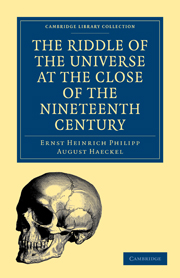Book contents
- Frontmatter
- Contents
- PREFACE
- AUTHOR'S PREFACE
- CHAPTER I THE NATURE OF THE PROBLEM
- CHAPTER II OUR BODILY FRAME
- CHAPTER III OUR LIFE
- CHAPTER IV OUR EMBRYONIC DEVELOPMENT
- CHAPTER V THE HISTORY OF OUR SPECIES
- CHAPTER VI THE NATURE OF THE SOUL
- CHAPTER VII PSYCHIC GRADATIONS
- CHAPTER VIII THE EMBRYOLOGY OF THE SOUL
- CHAPTER IX THE PHYLOGENY OF THE SOUL
- CHAPTER X CONSCIOUSNESS
- CHAPTER XI THE IMMORTALITY OF THE SOUL
- CHAPTER XII THE LAW OF SUBSTANCE
- CHAPTER XIII THE EVOLUTION OF THE WORLD
- CHAPTER XIV THE UNITY OF NATURE
- CHAPTER XV GOD AND THE WORLD
- CHAPTER XVI KNOWLEDGE AND BELIEF
- CHAPTER XVII SCIENCE AND CHRISTIANITY
- CHAPTER XVIII OUR MONISTIC RELIGION
- CHAPTER XIX OUR MONISTIC ETHICS
- CHAPTER XX SOLUTION OF THE WORLD-PROBLEMS
- INDEX
CHAPTER X - CONSCIOUSNESS
Published online by Cambridge University Press: 05 August 2011
- Frontmatter
- Contents
- PREFACE
- AUTHOR'S PREFACE
- CHAPTER I THE NATURE OF THE PROBLEM
- CHAPTER II OUR BODILY FRAME
- CHAPTER III OUR LIFE
- CHAPTER IV OUR EMBRYONIC DEVELOPMENT
- CHAPTER V THE HISTORY OF OUR SPECIES
- CHAPTER VI THE NATURE OF THE SOUL
- CHAPTER VII PSYCHIC GRADATIONS
- CHAPTER VIII THE EMBRYOLOGY OF THE SOUL
- CHAPTER IX THE PHYLOGENY OF THE SOUL
- CHAPTER X CONSCIOUSNESS
- CHAPTER XI THE IMMORTALITY OF THE SOUL
- CHAPTER XII THE LAW OF SUBSTANCE
- CHAPTER XIII THE EVOLUTION OF THE WORLD
- CHAPTER XIV THE UNITY OF NATURE
- CHAPTER XV GOD AND THE WORLD
- CHAPTER XVI KNOWLEDGE AND BELIEF
- CHAPTER XVII SCIENCE AND CHRISTIANITY
- CHAPTER XVIII OUR MONISTIC RELIGION
- CHAPTER XIX OUR MONISTIC ETHICS
- CHAPTER XX SOLUTION OF THE WORLD-PROBLEMS
- INDEX
Summary
Consciousness as a natural phenomenon. Its definition. Difficulties of the problem. Its relation to the life of the soul. Our human consciousness. Various theories: I. Anthropistic theory (Descartes). II. Neurological theory (Darwin). III. Animal theory (Schopenhauer). IV. Biological theory (Fechner). V. Cellular theory (Fritz Schultze). VI. Atomistic theory. Monistic and dualistic theories. Transcendental character of consciousness. The Ignorabimus verdict of Du Bois-Reymond. Physiology of consciousness. Discovery of the organs of thought by Flechsig. Pathology. Double and intermittent consciousness. Ontogeny of consciousness: modifications at different ages. Phylogeny of consciousness. Formation of concepts.
No phenomenon of the life of the soul is so wonderful and so variously interpreted as consciousness. The most contradictory views are current to-day, as they were 2,000 years ago, not only with regard to the nature of this psychic function and its relation to the body, but even as to its diffusion in the organic world and its origin and development. It is more responsible than any other psychic faculty for the erroneous idea of an “immaterial soul” and the belief in “personal immortality”; many of the gravest errors that still dominate even our modern civilization may be traced to it. Hence it is that I have entitled consciousness “the central mystery of psychology”: it is the strong citadel of all mystic and dualistic errors, before whose ramparts the best equipped efforts of reason threaten to miscarry.
- Type
- Chapter
- Information
- Publisher: Cambridge University PressPrint publication year: 2009First published in: 1900



